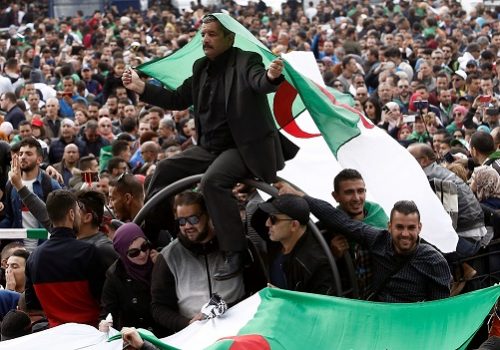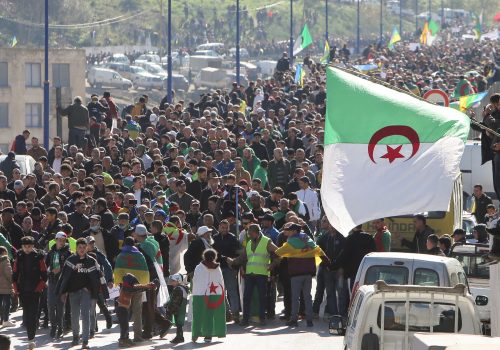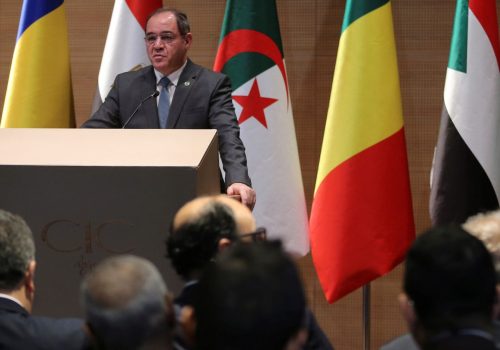Algeria’s parliamentary elections: A bumpy road ahead
Like previous elections, the Algerian parliamentary elections on June 12 are expected to have a low election turnout.
Algerians love talking politics, but voting is a step many have yet to take. For the vast majority, elections have failed to bring positive change to their daily life for years, but have been a means for those in charge to remain in power. However, much is at stake for the future elected parliament, as its members will be facing numerous big challenges, including the daunting task of re-establishing trust between the state and Algerian society. The unsatisfying political change in the past two years, which many Algerians see as cosmetic, has created profound dissatisfaction with the government.
While the coronavirus pandemic put on hold the Hirak movement, which commenced in February 2019, its resumption in February this year indicates that many Algerians have not renounced challenging the Algerian government. To recall, the Hirak, a massive peaceful demonstration of Algerians, put an end to President Abdelaziz Bouteflika’s twenty-year reign in April 2019, which also permitted the imprisonment of many corrupted politicians and businesspeople.
Voters are not the only ones who will snub the June elections. Political parties such as the liberal Rally for the Culture and Democracy, the leftist Workers Party, and the Socialist Workers Party have announced that they will not participate. The Socialist Front Forces, the oldest opposition party in Algeria, will also not participate, but keeps its distance from the Hirak’s nihilist call of “dégagisme”—the government’s departure.
On the other hand, parties such as the liberal New Generation Party plan to participate. According to party President Sofiane Djilali, “[In order for] the spirit of the Hirak to be anchored to institutions, there needs to be a compromise.” Thus, change can only come through the massive participation of Algerians in these elections.
Others, such as the pro-government parties—Liberation National Front, the National Rally for Democracy, the Rally for Hope for Algeria, and the Algerian Popular Movement—also plan to participate. However, since these parties were closely tied to former President Bouteflika, they are unlikely to win a significant number of seats.
The Islamists remain the unknown equation of these elections. According to Abderrazak Makri, leader of the Islamist Movement for the Peace of the Society the government party under the old regime could count on a large voting base for a time, but these elections should be transparent, honest, and credible.
More importantly, the Islamic Salvation Front (FIS) was defeated in the 1990s and now the Islamists have profoundly penetrated Algerian society. Its remnants are still very active, especially those based abroad, and its supporters are very influential through their rallies in mosques, universities, social networks, and even within the Hirak. During the coronavirus crisis, their disciples were visible, financially backing the youth’s posters used during Hirak rallies. They have even been able to convince secular parties of the need to be included in the political arena.
With multiple independent candidates leaning towards political Islam, this could be to the Islamists’ advantage. If they managed to win a majority of seats in parliament, the Islamists would then be a major challenge for the authorities, returning to the 1991 status quo ante when the FIS won the first round of parliamentary elections in December 1991. Following the cancellation of the second round in January 1992, many Islamists took up arms against both the government and civilians, which then led to a ‘black decade’ of violence where an estimated two hundred thousand Algerians were killed. For the Islamists, these elections may lay the grounds for future political battles, as, according to the new Constitution of November 2020, the government must be made up of the new majority in parliament.
The other main unorganized movement will be the Hirak itself—not as a conventional party but as a boycotting force. Since its inception, the Hirak has been successful in pointing out the numerous failures of the state and, while it contributes to a new dynamic, it has failed to put forward any concrete alternative.
The Hirak leaders’ refusal for any dialogue with the government unless their radical, unrealistic demand of the government’s departure is met has led to a dead end. However, their position is increasingly counterproductive as the movement is slowly being hijacked by other parties and groups such as the former FIS. Moreover, the authorities have recently engaged in a more coercive approach. In recent weeks, numerous citizens and journalists have been arrested, fined, and even jailed. It is difficult to say whether this is a means to silence opposition, intimidate in order to prevent large gatherings, or force more inclined Hirak leaders to engage in a dialogue with the government. In any case, it contributes to further distrust between a fringe of the population and the authorities, as this approach may only reinforce that no dialogue is possible with the government.
Regardless of the outcome of these elections, the main challenge for authorities will be to reestablish trust with society. One way to do so is for the daily economic situation of Algerians to improve rapidly, which is an almost impossible task in the short term. Therefore, the future government will need to bring prominent figures of the Hirak to the discussion table to convince them that compromise at this stage is the only way forward to unlock this quasi-quagmire that is putting Algerians and their country in an extremely difficult geopolitical and economic situation. To do so, a consensus must urgently be found. One way to achieve this goal may be for the Hirak to elect a representative in each province. These representatives would then gather in a national meeting to agree on a national agenda, which would, in turn, lead to a dialogue with the authorities.
The survival of the Hirak is at stake should it pursue its strategy of non-dialogue. Since February 2019, the Algerian authorities have shown that they can meet some realistic demands while pursuing their roadmap. While the political train in Algeria has been slowing down since 2019, it has nonetheless continued its journey. Those in charge in Algeria know too well that nature abhors political vacuums—a reminder to the Hirak, whose tremendous political gains in 2019 could all be ruined if its “want it all” strategy is not rapidly reconsidered.
Finally, if those behind the system since 1962 and reinforced under Bouteflika’s era are the ones who brought Algeria to the edge of the cliff, today, it is the Hirak and its nihilistic attitude that risks pushing the country into the abyss. February 2019 is not an end but an additional step in the political construction of Algeria, which has yet to be completed.
Abdelkader Abderrahmane is a senior researcher at the Institute for Security Studies (ISS). He has written extensively on North-West Africa geopolitical issues.
Image: Parliamentary candidates posters are hanged on June 2, 2021 in Algiers, Algeria. In Algiers, the country's largest constituency, with 34 deputy seats to be filled (out of 407), most electoral panels are half empty, about two weeks after the campaign began. Some of the pasted posters get ripped quickly and are not readable. These elections, which were supposed to take place in 2022 but were brought forward, appear as an attempt by the government, whose pillar is the military, to regain control in the face of Hirak's return to the streets from late February. Photo by Louiza Ammi /ABACAPRESS.COM


